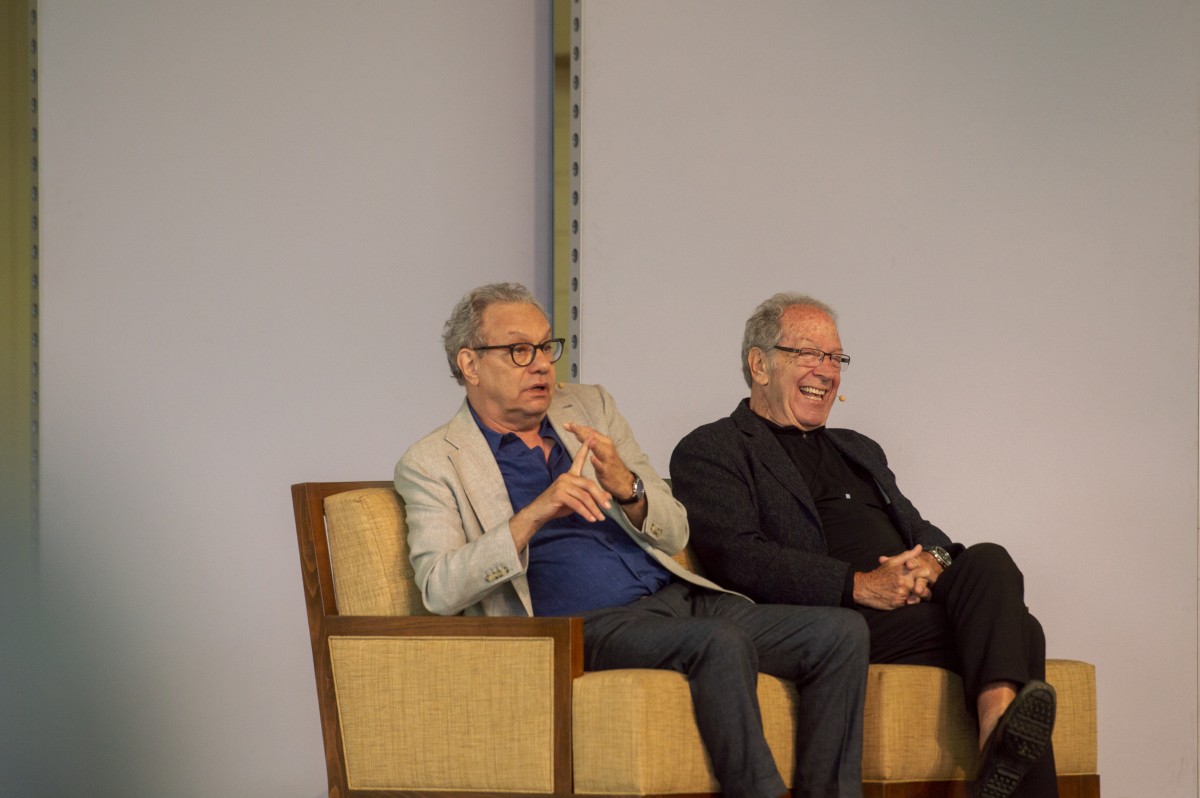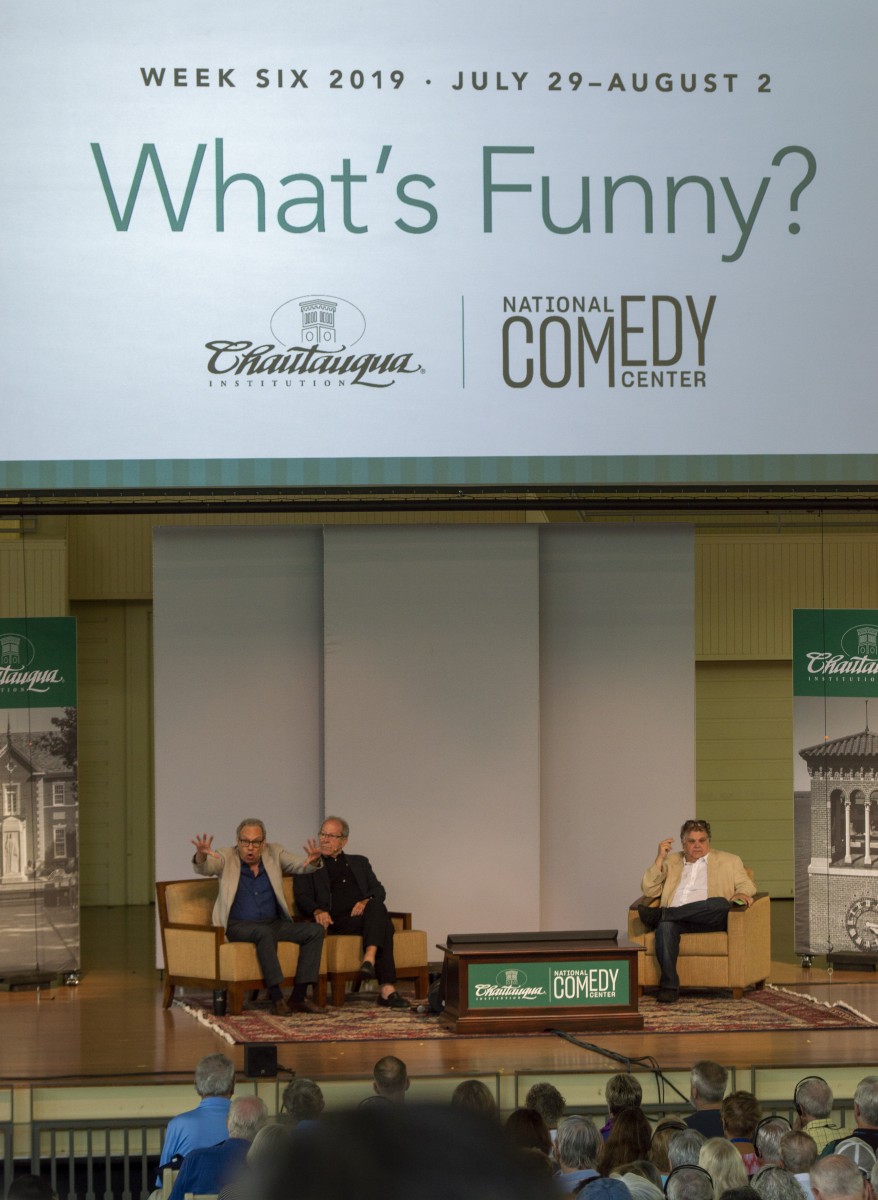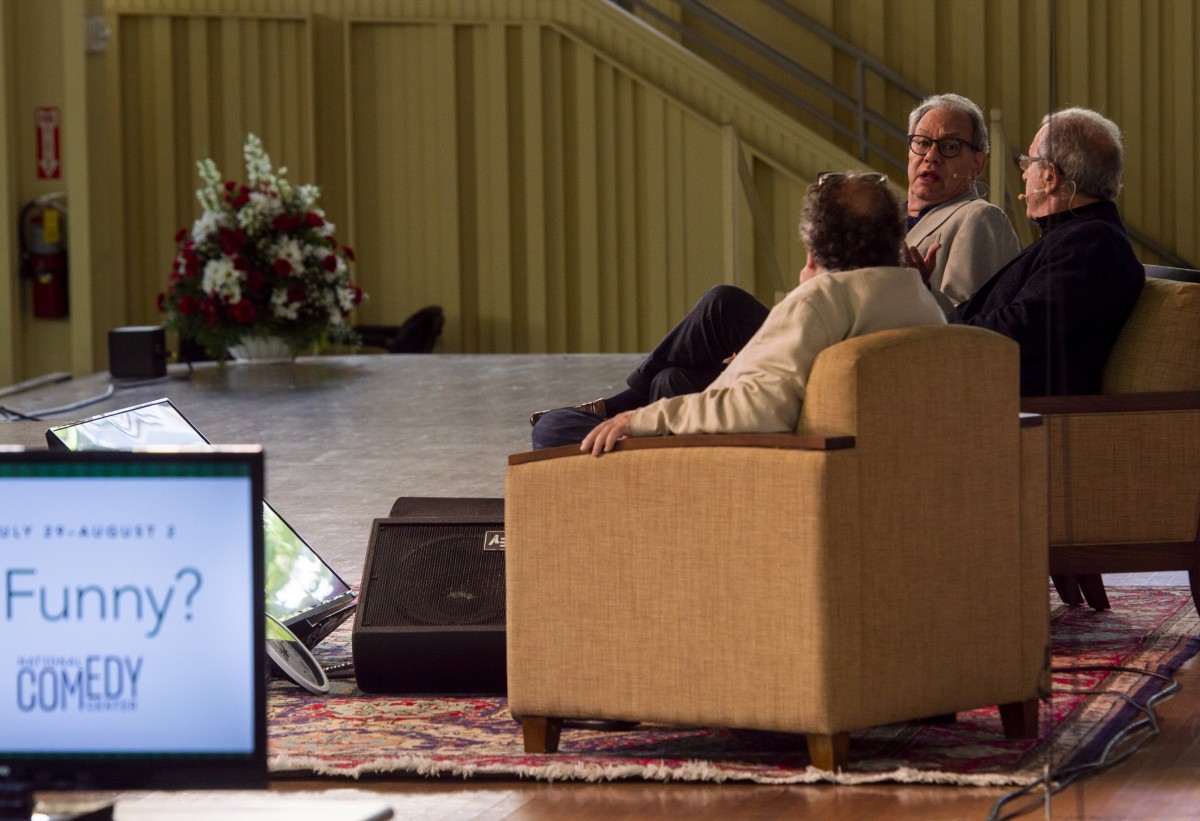He was the Marx Brothers, but in one person — a naughty little boy, a genius, a nut, manic, utter magic — these were all words used by David Steinberg and Lewis Black to describe Robin Williams, stand-up comedian, Academy Award-winning actor and “life junkie.”
For “Managing Genius: 43 years with Robin Williams,” Steinberg, Williams’ manager of 43 years, and Black, Williams’ close friend, joined radio personality and comedian Ron Bennington in conversation at 10:45 a.m. Thursday in the Amphitheater, continuing Week Six, “What’s Funny? In Partnership with the National Comedy Center.”
“I have really, truly been blessed to wake up every day, and know I was going to talk to Robin and be involved in what people really felt was the greatest comedy legend — he would actually ask me questions that pertained to what he was going to do,” Steinberg said.
Williams grew up a “very lonely child,” according to Steinberg. Williams’ father was a senior executive at Ford Motor Company and his mother joined him for a majority of his work trips, leaving Williams alone to occupy himself with his imagination.
“This overactive imagination started as a child because he had to be his own playmate,” Steinberg said. “He played in his head and he created his environment out of loneliness, and he continued that on.”
Steinberg said Williams also spent a lot of time playing “lonely sports,” first running cross country and then biking up to 40 miles a day.
“That’s where he used to decide who he was or what he was going to do and evolve some of his material stuff,” Steinberg said. “He was never afraid to try it out.”
Williams’ career began with stand-up comedy shows in the 1970s. In his shows, Williams never knew what subject he was going to touch on, let alone any of the specifics. Still, he was known for doing “really long shows,” and it got to the point where Steinberg would have to remind him that the audience members had lives and families to return to.
“Robin was just a life junkie. When he was on stage, he was just going to have the best time,” Steinberg said. “He was having fun, but there was a desperation; he had to end up with a big laugh. It was a lot like sex, he needed a big finish.”
Steinberg said Williams could get away with anything when he performed.
“He could say things in a room full of priests that would get someone’s mouth washed out, and he would get high-fives,” Steinberg said. “He had these gorgeous blue eyes and he was really just a naughty little boy who said ‘fuck it’ and got away with it.”
Williams couldn’t get enough of an audience’s attention — he wanted to “give everything and have everything.” Steinberg said he was so “nuts” at the beginning of his career that Steinberg had to hire someone to secretly follow him around.
“It was just so he didn’t hurt himself,” Steinberg said. “He was a young kid, a 22-year-old who was a giant superstar in every area and had, really, all the money in the world; but he never cared about money, he gave it away. That was never what motivated him — but enjoyment, he was an enjoyment pig.”
When Williams couldn’t fill his voids with enjoyment anymore, he turned to drugs and alcohol. In the late ’70s, Williams was addicted to cocaine and alcohol until the drug-induced death of a dear friend, and the birth of his son, convinced him to change. However, in 2003, he started drinking again.
Black saw Williams’ alcoholism up close when the two worked together on the 2006 movie, “Man of The Year.” The two would begin their day filming scenes, but even when they were done, Williams kept going. He would spend the rest of the afternoon smoking out back with the other actors, watching their scenes and giving advice when needed, and then he would venture to clubs, using open mic nights to continue practicing some of his scenes.
“It demands a level of commitment from the performer that is unheard of,” Black said. “What he had was a commitment on a level of, ‘I am going to do something that one would say is close to magic.’ It really was true magic.”
Black said Williams always woke up the next morning with an abundance of energy, ready to do it all again. One night, Black saw firsthand how he did it: Williams came down to a bar at midnight to have a shot of tequila and a shot of espresso.
“Williams turned to me and said, ‘I think I have a problem,’ ” Black said. “I said to him, ‘If you have a problem, I think I have to go to rehab today.’ ”
After they filmed “Man of the Year,” Williams checked himself into a substance-abuse rehabilitation center in Newberg, Oregon.
When he left the rehabilitation center, he immediately moved to New York City, to work on a Broadway show. Luckily, there were multiple Alcoholics Anonymous meeting locations in the area.
“There is nothing like a New York City 12-step meeting,” Bennington said. “It’s the most entertaining place you will ever go, but he would be so funny and sweet about the darkest things in the world.”
In his own life and the lives of people he met, Williams believed that humor could heal. Steinberg said he would visit hospitals and travel overseas on USO tours, spending hours with people to hear their stories and spark some laughs.
“He had the ability to withstand that emotionally,” Steinberg said. “There was no place he was unwilling to try to get to. He over-laughed, he over-cried, but it was all real. It’s how he felt. He didn’t try to mask his feelings to the public. He was who he was, and he was the most giving person.”
In September 2010, Steinberg and Williams went to New Zealand for a show after the country suffered a 7.1-magnitude earthquake. The day of the show, Williams spontaneously decided he wanted to donate 100% of the money back to the people affected.
“That was the first thing that came to Robin’s mind: The people need the show,” Steinberg said. “He wasn’t worried, as a lot of performers would be, with ‘Are the people going to be able to laugh?’ Robin said they needed a laugh, that he didn’t need the money and they did, and it was a perfect marriage of circumstances.”
Williams also visited victims of abuse and invited Make-A-Wish children to come on set with him, always making sure no press was around to see him do it.
“He had this horrible fear of people thinking he was trying to capitalize on something,” Steinberg said.
Williams had the same fears on his USO tours, Steinberg said.
“He didn’t want to appear as the Bob Hope for the Middle East wars,” he said.
When Black went to Iraq with Williams for their first USO tour, Williams read an entire book about the history of Iraq to prepare. Williams spent part of the trip giving people history lessons, quoting direct facts and lines from the book.
In that moment, Black realized Williams had a photographic memory, a fact he uses to debunk myths that Williams stole stand-up material throughout his career.
“He was so fast that he couldn’t have thought about it,” Black said. “I think people have wrongly accused him of that and at least in my time with him, I don’t think that was even close to being the case.”
Bennington said it was important to note that Williams was against war, but still chose to support the soldiers unconditionally.
“You cannot be against the troops, and be against the war,” Bennington said.
On the tours, Williams wouldn’t go to sleep until he shook the hand of every soldier on the base.
“It’s the level of commitment that these soldiers have, that’s the loneliest job there is,” Steinberg said. “It’s a horrible moment when you are pulling out of these bases and you’re leaving and they’re waving goodbye, and you know they’re staying. Those were the toughest moments for me.”
Black said it was the commitment of the soldiers to one another that struck him the most.
“If the American people had 3% of the commitment to each other that the troops have to each other on a daily basis, we would have no problems whatsoever,” Black said.
As the panel reflected on the laughs and life of Williams, who died by suicide in his California home on Aug. 11, 2014, Bennington noted the discussion also served as a reflection of Steinberg’s work.
“Good management is a nice thing to have, genius is a better thing to have,” Steinberg said. “The place where most guys, who do what I do, make that mistake is they forget which one is the genius.”
Williams was “utter magic,” portraying a genie, a scientist, a nanny, a teacher, among other iconic characters — a repertoire he developed, Steinberg said, because he was “fearless.”
“Robin spent his entire personal life and public life on a tightrope; he loved pushing the envelope,” Steinberg said. “Nothing in the world scared him. If he was asked to do something as an actor, he would always ask to do more. The thought of failure intrigued him and he was always fighting against that.”







